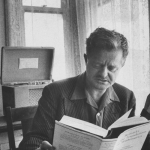The summer of nineteen eighteen
I read The Jungle and The
Research Magnificent. That fall
My father died and my aunt
Took me to chicago to live.
The first thing I did was to take
A streetcar to the stockyards.
In the winter afternoon,
Gritty and fetid, I walked
Through the filthy snow, through the
Squalid streets, looking shyly
Into the people’s faces,
Those who were home in the daytime.
Debauched and exhausted faces,
Starved and looted brains, faces
Like the faces in the senile
And insane wards of charity
Hospitals. Predatory
Faces of little children.
Then as the soiled twilight darkened,
Under the green gas lamps, and the
Sputtering purple arc lamps,
The faces of the men coming
Home from work, some still alive with
Some sly and bitter, some smart and
Silly, most of them already
Broken and empty, no life,
Only blinding tiredness, worse
Than any tired animal.
The sour smells of a thousand
Suppers of fried potatoes and
Fried cabbage bled into the street.
I was giddy and sick, and out
Of my misery I felt rising
A terrible anger and out
Of the anger, an absolute vow.
today the evil is clean
And prosperous, but it is
Everywhere, you don’t have to
Take a streetcar to find it,
And it is the same evil.
And the misery, and the
Anger, and the vow are the same.


















Comment form: